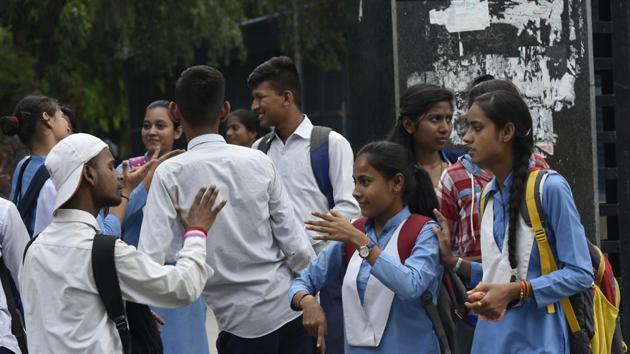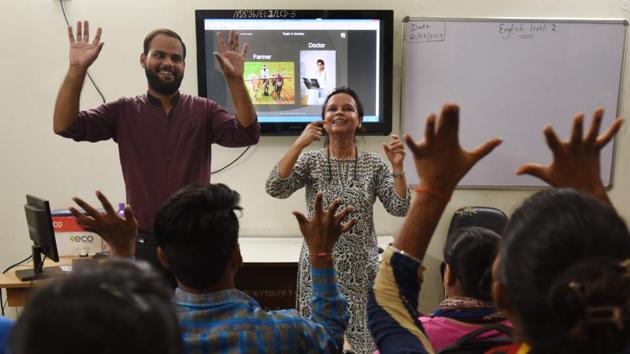Photos: For India’s hearing impaired, scant means for effective learning
Updated On Sep 06, 2019 11:46 AM IST
Education continues to be a distant dream for a majority of hearing impaired kids in India as oralism, not sign language, dominates classrooms in their schools. There are about 2 million deaf children in the country — a vast majority of who attend only primary schools before dropping out. Many such students who are studying in mainstream schools too complain of apathetic attitude towards their needs. According to World Health Organisation, hearing loss affects not just academic outcomes, but communication, cognition, behaviour and social-emotional development in the young.
1 / 8

Updated on Sep 06, 2019 11:46 AM IST
A slogan, ‘Deaf but not dumb’, on a wall at the Noida Deaf Society. Om Negi, 16, from Ghaziabad, and Uttam Tiwari, 17, from Patna had both attended schools for the hearing impaired, but were disappointed with the lack of infrastructure to accommodate their learning. They are now among 50 others attending remedial classes in Maths and English at the Noida Deaf Society, an NGO, which works for the education of deaf children. (Virendra Singh Gosain / HT Photo)
2 / 8

Updated on Sep 06, 2019 11:46 AM IST
Disability rights activists say that Indian Sign Language (ISL) should be introduced as an optional language in school curriculum and be recognised as an official language to make education accessible to deaf children. “Education for the deaf in India is meaningless without sign language for they are left unable to read or write,” said AS Narayanan, President, National Association of the Deaf (NAD). (Vipin Kumar / HT Photo)
3 / 8

Updated on Sep 06, 2019 11:46 AM IST
Those working with the deaf community said that while the number of schools for the deaf has risen–to about 110 government and roughly 600 private schools— a vast majority are pre-primary and primary. The capital has about a dozen and the only senior secondary, Govt Lady Noyce Senior Secondary School for the Deaf, suffers from neglect with 550 students but only about 25 teachers against a sanctioned strength of 70. (Vipin Kumar / HT Photo)
4 / 8

Updated on Sep 06, 2019 11:46 AM IST
Most regular schools lack infrastructure tuned to the needs of the hearing impaired, say disability rights activists. To meet statutory requirements, they hire special educators, most specialising in visual impairment or mental retardation. “Deaf children need to be mainstreamed. Special educators must know ISL, and the teaching environment in deaf schools should be more visual,” said Ruma Roka, founder Noida Deaf Society. (Virendra Singh Gosain / HT Photo)
5 / 8

Updated on Sep 06, 2019 11:46 AM IST
A class at Noida Deaf Society. According to Association of Sign Language Interpreters, there are only 500 interpreters in the country. And even they do not get any permanent employment, taking part-time freelance assignments instead. “We have never been engaged by schools to work with students or teachers on sign language,” said Preeti Singh Lang, general secretary, of the Delhi-based association. (Virendra Singh Gosain / HT Photo)
6 / 8

Updated on Sep 06, 2019 11:46 AM IST
A student communicates with the class at Noida Deaf Society. Most deaf children are born to hearing parents, and experts believe that parents who know sign language find it easier to communicate with their child on a deeper level. “It is extremely saddening that parents of deaf children do not know Indian Sign language,” said Narayanan, adding that both knowledge and communication are a crucial part of any child’s growth. (Virendra Singh Gosain / HT Photo)
7 / 8

Updated on Sep 06, 2019 11:46 AM IST
In September 2015, Indian Sign language Research and Training Centre, an autonomous body under the Department of Empowerment of Persons with Disabilities was set up after a long struggle for the development and promotion of ISL. Earlier this year, it launched the second edition of the ISL dictionary which lists 6,000 words in Hindi and English along with their corresponding graphic representation. (Virendra Singh Gosain / HT Photo)
8 / 8

Updated on Sep 06, 2019 11:46 AM IST



